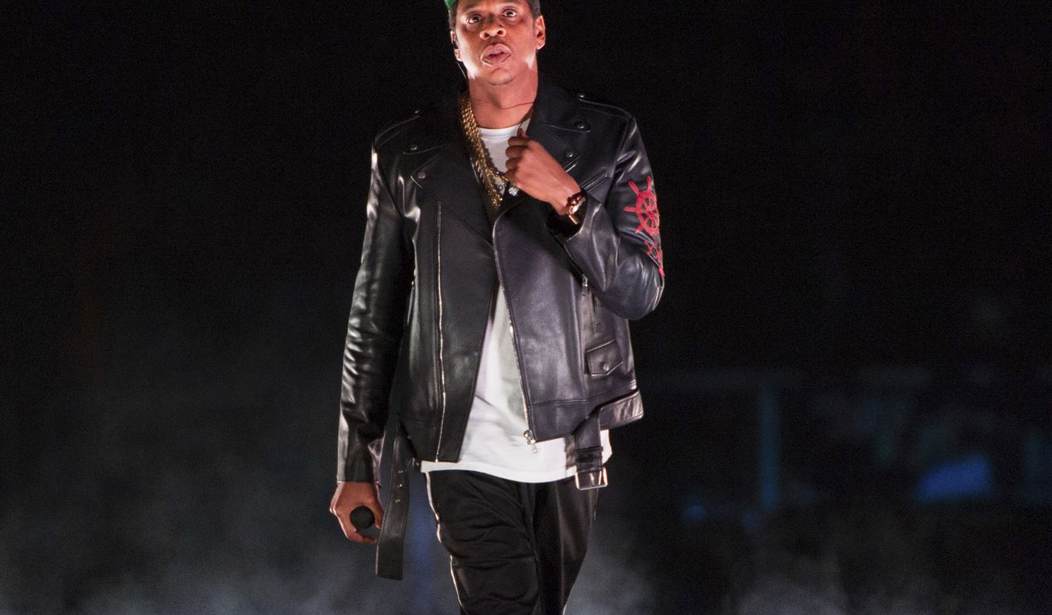If you’re sensitive to overt displays of “Islamophobia,” avert your eyes: the Turkish publication Daily Sabah reported Tuesday that “U.S. rapper and business mogul Jay Z was spotted exiting a restaurant in Santa Monica, California last week.” This would have been a trivial event of interest only to Jay-Z fans had it not been for one all-important detail: “What caught the paparazzi’s and fans’ attention, however, was the T-shirt he was wearing, which bore the image of a mosque.”
The Daily Sabah report explained that Jay-Z’s sartorial choice “featured the Riyadha Mosque in Lamu, Kenya, and was created by Kenyan born-and-bred fashion designer Zedekiah Lukoye, popularly known as Zeddy Loky. Both Jay Z and Lukoye quickly earned praise on social media for bringing more attention to black designers and cultural symbols.”
Not everyone was thrilled by this, however: “it seems that using such a holy symbol as a design on a T-shirt has frustrated the management of the mosque and the Muslim fraternity in Lamu. The Riyadha Mosque is recognized as one of the most prestigious centers for Islamic studies in East Africa.”
Kamala Harris Is Getting Advice From Hamas-Linked CAIR
“Frustrated” is a mild way of putting it. “Enraged” would have been more accurate. “In a letter dated April 3, 2021, and addressed to Lukoye,” Daily Sabah reported, “the mosque said it was deeply concerned about the portrayal and misuse of the mosque’s image, asking the designer to issue a public apology.”
Abubakar Badawy, the secretary-general of Riyadha Mosque management, fumed in the latter: “We don’t consider this an honor, nor a privilege, for the historical mosque and its Founder Habib Swaleh for its imagery to be portrayed in such a way.”
This wasn’t the first time that Lukoye’s mosque t-shirt had enraged Badawy and his colleagues. “On Feb. 7,” Daily Sabah reported, “a man wearing the same T-shirt in a bar also drew ire from the mosque and Muslims in the county after a photo of him was posted on Facebook.”
Badawy accordingly included this in his letter to Lukoye: “Bars and clubs are an affront to the spiritual respect and dignity of the mosque, its founder, to the congregation, and the general Muslim community within and outside Lamu. We therefore politely request you to show respect for the mosque by removing our Mosque’s portrait on the shirt, to show us that you really do respect the people of Lamu and the Mosque.”
The letter added: “We encourage you to keep promoting Lamu. However, kindly in future please consider the cultural relevance of what you choose to portray on your shirts, to make sure you are not appropriating a minority community’s culture and practices to promote something that is contrary to their beliefs.”
However “polite” this “request” was, there was an unmistakable hint of menace behind it: some of Badawy’s coreligionists, after all, might not content themselves with writing letters, but will opt instead for more kinetic ways to demonstrate their rage at those who would dare commit “blasphemy.”
Another Muslim leader, Coast Interfaith Council of Clerics (CICC) chairperson Mohamed Abdulkadir, agreed with Badawy, explaining that a holy place such as a mosque should not be lumped together “with worldly things” such as T-shirts.
Abdulkadir said that Lukoye “should understand that what he did was wrong not only for Riyadha Mosque but Islam in general. You cannot associate a religious minaret with worldly things. You print a T-Shirt with a logo that might end up in clubs and bars. Let him apologize.”
SPLC Uses Anniversary of Islamic Terror Attack to Demonize Conservative Christians
As for Jay-Z, he almost certainly didn’t mean any insult, but to show pride in the place, but his intention is immaterial to those who are complaining.
What is noteworthy about this whole affair, however, is that while the reaction of Badawy and Abdulkadir is routine and expected, we never see Muslim leaders enraged and demanding an apology over the alleged twisting and hijacking of their religion by jihadis. And actual incidents of “Islamophobia” are so thin on the ground that Muslim leaders have the time to fulminate about T-shirts, a jarringly different scenario from the establishment media narrative of Muslims being subjected to unusual persecution and harassment. If Jay-Z’s T-shirt is among the biggest problems you’re facing, things can’t be all that bad.










Join the conversation as a VIP Member